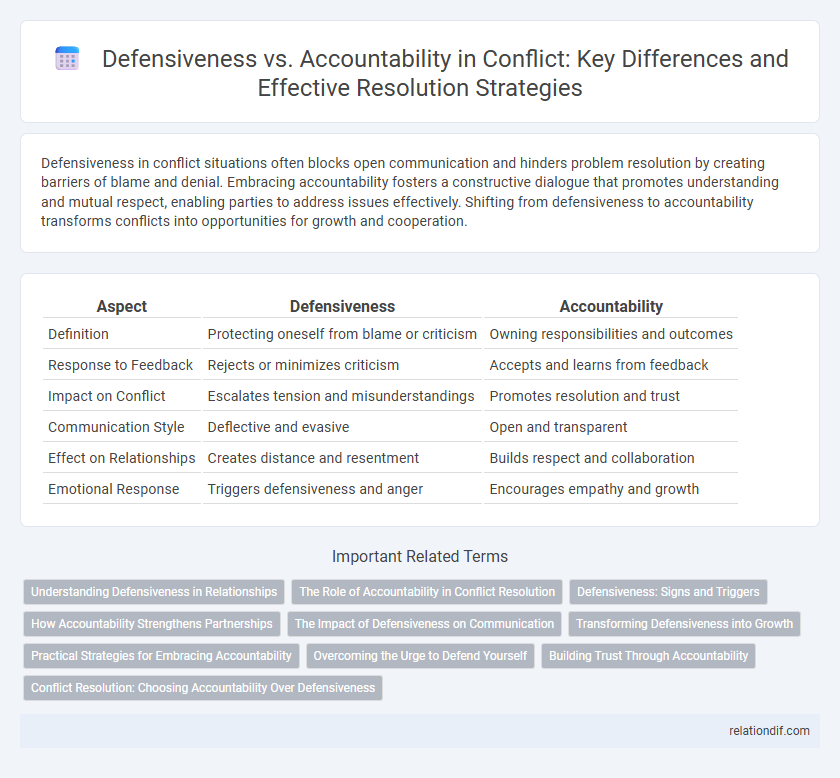Defensiveness in conflict situations often blocks open communication and hinders problem resolution by creating barriers of blame and denial. Embracing accountability fosters a constructive dialogue that promotes understanding and mutual respect, enabling parties to address issues effectively. Shifting from defensiveness to accountability transforms conflicts into opportunities for growth and cooperation.
Table of Comparison
| Aspect | Defensiveness | Accountability |
|---|---|---|
| Definition | Protecting oneself from blame or criticism | Owning responsibilities and outcomes |
| Response to Feedback | Rejects or minimizes criticism | Accepts and learns from feedback |
| Impact on Conflict | Escalates tension and misunderstandings | Promotes resolution and trust |
| Communication Style | Deflective and evasive | Open and transparent |
| Effect on Relationships | Creates distance and resentment | Builds respect and collaboration |
| Emotional Response | Triggers defensiveness and anger | Encourages empathy and growth |
Understanding Defensiveness in Relationships
Defensiveness in relationships often emerges as a protective response to perceived criticism or threat, hindering open communication and resolution. Recognizing this behavior is crucial to fostering accountability, where individuals take responsibility for their actions without feeling attacked. Cultivating mutual understanding reduces barriers of defensiveness, promoting healthier conflict resolution and emotional intimacy.
The Role of Accountability in Conflict Resolution
Accountability plays a critical role in conflict resolution by promoting transparency and responsibility among parties involved, which reduces defensiveness and fosters open communication. When individuals acknowledge their actions and their impact, it builds trust and facilitates mutual understanding, accelerating the resolution process. Organizations that implement accountability frameworks experience lower conflict recurrence and enhanced collaboration.
Defensiveness: Signs and Triggers
Defensiveness often manifests through behaviors such as interrupting, denying responsibility, and making excuses during conflict situations. Common triggers include perceived personal criticism, threats to self-esteem, and feelings of vulnerability or injustice. Recognizing these signs helps in managing emotional responses and fostering healthier communication dynamics.
How Accountability Strengthens Partnerships
Accountability fosters trust and transparency, essential elements that reduce defensiveness in conflict situations within partnerships. By openly acknowledging mistakes and committing to solutions, partners create a collaborative environment that strengthens mutual respect and effective communication. This proactive approach transforms conflicts into opportunities for growth, enhancing long-term partnership resilience.
The Impact of Defensiveness on Communication
Defensiveness in conflict significantly impairs effective communication by creating barriers to open dialogue and mutual understanding. When individuals respond defensively, they often shift focus from the issue to protecting themselves, which escalates tension and hinders problem resolution. This defensive behavior reduces accountability, preventing constructive feedback and prolonging the conflict cycle.
Transforming Defensiveness into Growth
Transforming defensiveness into growth requires embracing accountability as a core response to conflict, fostering a mindset that views feedback as an opportunity rather than a threat. Psychological research shows that individuals who develop emotional resilience and active listening skills reduce defensive reactions by reframing criticism into constructive learning experiences. Organizations that implement accountability frameworks see enhanced team cohesion and conflict resolution effectiveness, driving continuous improvement and innovation.
Practical Strategies for Embracing Accountability
Embracing accountability in conflict situations involves recognizing personal responsibility and actively seeking feedback to improve communication and behavior patterns. Practical strategies include setting clear expectations, practicing active listening to understand differing perspectives, and using "I" statements to express feelings without assigning blame. These approaches reduce defensiveness, foster trust, and create a foundation for constructive conflict resolution.
Overcoming the Urge to Defend Yourself
Overcoming the urge to defend yourself in conflict requires embracing accountability by actively listening and acknowledging others' perspectives without interruption. Adopting a mindset that values growth over ego reduces defensiveness and fosters constructive dialogue. Research in conflict resolution highlights that individuals who practice self-reflection and emotional regulation are more likely to reach mutual understanding and resolve disputes effectively.
Building Trust Through Accountability
Building trust in conflict situations hinges on embracing accountability instead of defensiveness, which fosters open communication and mutual respect. When individuals take responsibility for their actions and acknowledge mistakes, it creates a foundation for transparency and reduces misunderstandings. This commitment to accountability encourages collaborative problem-solving and strengthens relationships over time.
Conflict Resolution: Choosing Accountability Over Defensiveness
Choosing accountability over defensiveness in conflict resolution fosters open communication and strengthens trust between parties involved. Embracing responsibility for one's actions enables constructive dialogue, reduces misunderstandings, and accelerates problem-solving. This approach transforms conflicts into opportunities for growth and collaboration, promoting long-term relationship resilience.
defensiveness vs accountability Infographic

 relationdif.com
relationdif.com